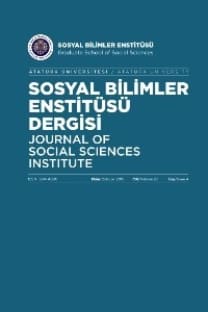Three Dimensions of Leadership Expectations of International Students in Modern Higher Education Settings
Günümüz Yükseköğretim Ortamlarındaki Uluslararası Öğrencilerin Liderlik Beklentilerinin Üç Boyutu
liderlik, ; uluslararası yerleşke uluslararası öğrenci,
___
Avolio, B. J., and Bass, B. M. (2002). Developing potentials across a full-range of leadership. Mahwah, NJ: Lawrence Erlbaum Associates.Bogdan, R. C. and Biklen, S. K. (2007). Qualitative research for education: An introduction to theory and methods (5th ed.). Boston: Pearson Education, Inc.
Bolden, R. (2011). “Distributed leadership in organizations: a review of theory and research”. International Journal of Management Reviews, 13, 251-269. doi: 10.1111/j.1468-2370.2011.00306.x
Brantmeier, E. J. and Bajaj, M. (2013). Peace education praxis: Select resources for educators and researchers. In Educating about Social Issues in the 20th and 21st Centuries: A Critical Annotated Bibliography. Vol. 2, edited by S. Totten and J. Pedersen. Charlotte, NC: Information Age.
Burns, J. M. (1978). Leadership. New York: Harper & Row.
Can, N. (2009). "The leadership behaviors of teachers in primary schools in Turkey”. Education. 129(3), 436-447.
Clarke, M. and Hennig, B. (2013). “Motivation as ethical self-formation”. Educational Philosophy and Theory, 45, 77-90. doi: 10.1080/ 00131857.2012. 715386
Doyle, T. and Brady, M. (2018). “Reframing the university as an emergent organisation: implications for strategic management and leadership in higher education”. Journal of Higher Education Policy and Management, 40(4), 305-320. DOI: 10.1080/1360080X.2018.1478608
Dörnyei, Z. and Murphey, T. (2009). Group dynamics in the language classroom (4th Ed.). Cambridge: Cambridge University Press. DuBrin, A. J. (1990). Essential of management (2nd Ed.). Cincinnati, Ohio: South-Western Pub. Co.
Garg, N. and Gera, S. (2019). “Gratitude and leadership in higher education institutions: Exploring the mediating role of social intelligence among teachers”. Journal of Applied Research in Higher Education. DOI 10.1108/JARHE-09-2019-0241
Gaus, N., Basri, M. Thamrin, H., and Ritonga, F. (2020). “Understanding the nature and practice of leadership in higher education: A phenomenological approach”. International Journal of Leadership in Education. DOI:10.1080/13603124.2020.1737241
Gigliotti, R., Dwyer, M., Brescia, S., Gergus, M., and Stefanelli, J. (2020). “Learning leadership in higher education: Communicative implications for graduate education”. Atlantic Journal of Communication. DOI: 10.1080/15456870.2020.1720990
Hannerz, U. (1990). “Cosmopolitans and locals in world culture”. Theory, Culture & Society, 7, 237-251. doi: 10.1177/026327690007002014.
Harrison, J. L. (2011). “Instructor transformational leadership and student outcomes”. Emerging Leadership Journeys, 4(1), 82-136.
Holzweiss, P., Walker, D., and Conrey, M. (2019). “Preparing new professionals for administrative leadership in higher education: identifying specific skills for training”. Perspectives: Policy and Practice in Higher Education, 23(2-3), 54-60, DOI:10.1080/13603108.2018.1543217
Hook, P. and Vass, A. (2000). Confident classroom leadership. London: David Fulton.
Janfanda, M. (2017). “Enriching ethical leadership in higher education as advanced learning”. Journal of Leadership Studies, 11(2), 57-59.
Khondker, H. (2013). “Globalization, glocalization, or global studies: What's in a name?” Globalizations, 10(4), 527-531. doi:10.1080/14747731.2013.806747
Laub, J. A. (1999). Assessing the servant organization: Development of the servant organizational leadership assessment (SOLA) instrument (Doctoral dissertation). Retrieved from ProQuest Dissertations & Theses Global. (UMI No. 9921922)
Lechner, F. and Boli, J. (2005). World Culture: Origins and Consequences. Oxford: Basil Blackwell.
Ortega, L. (2009). Understanding second language acquisition. London, United Kingdom: Hodder.
Pounder, J. S. (2008). “Transformational classroom leadership: A novel approach to evaluating classroom performance”. Assessment & Evaluation in Higher Education, 33(3), 233-243. doi: 10.1080/02602930701292621
Salinas, H. (2012). The role of student self-reported spirituality and perceptions of community college instructor transformational leadership style on the overall rating of teacher effectiveness (Doctoral dissertation). Retrieved from ProQuest Dissertations & Theses Global. (UMI No. 3574618)
Sewerin, T. and Holmberg, R. (2017). “Contextualizing distributed leadership in higher education”. Higher Education Research & Development, 36(6), 1280-1294. DOI:10.1080/07294360.2017.1303453
Skalicky, J. Pedersen, K., van der Meer, J., Fuglsang, S., Dawson, P., and Stewart, S. (2020). “A framework for developing and supporting student leadership in higher education”. Studies in Higher Education, 45(1), 100-116. DOI: 10.1080/03075079.2018.1522624
Takkaç Tulgar, A. (2018). “Students’ views on the maintenance of peace education in glocal second language setting”. Journal of Language and Linguistic Studies, 14(4), 150-161.
Takkaç Tulgar, A. (2019). “Exploring the bi-directional effects of language learning experience and learners’ identity (re)construction in glocal higher education context”. Journal of Multilingual and Multicultural Development, 40(9), 743-758.https://doi.org/10.1080/01434632.2019.1611837
Walumbwa, F.O., Wu, C., and Ojode, L. A. (2004). “Gender and instructional outcomes: The mediating role of leadership style”. The Journal of Management Development, 23(2), 124-140. doi: 10.1108/02621710410517229
Winston, B. E. and Patterson, K. (2006). “An integrative definition of leadership”. International Journal of Leadership Studies, 1(2), 6-66.
Yin, R. K. (1984). Case study research: Design and methods. Bever
- ISSN: 1304-4990
- Yayın Aralığı: Yılda 4 Sayı
- Yayıncı: Atatürk Üniversitesi Sosyal Bilimler Enstitüsü Müdürlüğü
Kırsal Alanların Sürdürülebilir Turizm Kapsamında Değerlendirilmesinin Manisa İli Özelinde Analizi
Klasik Arap Edebiyatında Aykırı Bir Şair Ebū Mihcen es-Sakafī
Heykel Sanatına Disiplinler Arası Bir Yaklaşım
Çimento Fabrikası Üretim Hattının Simülasyonla İncelenmesi
Vecihi YİĞİT, Pınar Münevver ASLAN
Çoklu Bölüm İçin Adil Hemşire Çizelgeleme
Muhammed Emre KESKİN, Elif KILIÇ DELİCE, Gökay AKKAYA
Borsa İstanbul’da İşlem Gören Bankaların Finansal ve Borsa Performanslarına Dair Bir İnceleme
Fevzi Serkan ÖZDEMİR, Mehpare KARAHAN GÖKMEN, Oguzcan AKDEMİR
Covid-19 Pandemisi Sürecinde Uzaktan Eğitim Sürecinin Öğrenci Perspektifinden Değerlendirilmesi
Cem GÜRLER, Tuğçe USLU, İkram DAŞTAN
“Örgütsel Atalet Ölçeği” nin Türkçeye Uyarlanması, Geçerlik ve Güvenirlik Çalışması
Kenan ORÇANLI, Mustafa BEKMEZCİ, Z. Mehmet FIRAT
Kamuların Durumsal Kuramına Genel Bakış: 1992-2019 Arası Araştırma Makaleleri
